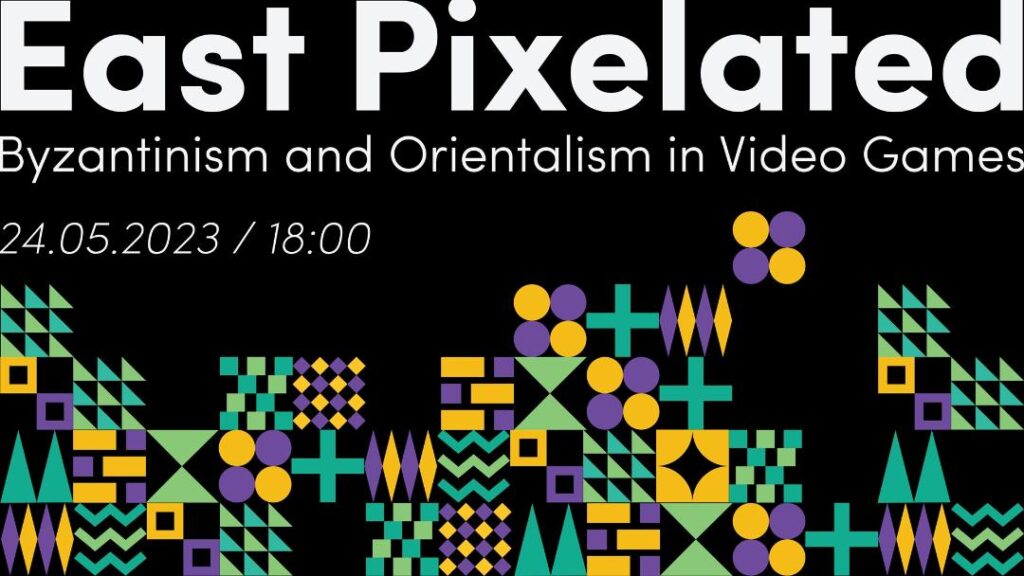East Pixelated: Byzantinism and Orientalism in Video Games
Istanbul Research Institute, Swedish Research Institute in Istanbul, and Özgen Berkol Doğan Science Fiction Library organize a joint panel conversation that explores the portrayal of “the East” in video games. The conversation investigates the intersection of Byzantinism, which is the fascination with the Byzantine Empire, and Orientalism, which is the exoticization of the East. It analyzes how video games, as a form of popular media, perpetuate cultural stereotypes and propagate an idealized image of the East. By examining specific examples of video games that incorporate elements of Byzantinism and Orientalism, the talk aims to shed light on the ways in which popular media imagine cultural biases and shape our understanding of the world.
Event Address: Özgen Berkol Doğan Bilimkurgu Kütüphanesi, Caferağa Mah. Safa Sk. No:20, 34710 Kadıköy/İstanbul
Date&Time: May 24, 2023 / 18:00
Contact us at +90 216 349 31 31 or [email protected]
The event is free of charge and places are limited. RSVP is required. Please visit Google Form Link or you can contact us via phone number.
The panel language is English and simultaneous translation is not available.

Digital Orientalism: Representations of the Middle East in Video Games
Vít Šisler
The talk critically analyzes the ways in which the Middle East has been represented in video games. First, it discusses how various genres of American and European video games have constructed the Middle Eastern environments and characters. Within many games, the diverse ethnic and religious identities of the Middle Eastern world have been flattened out and reconstructed into a series of stereotypes operating within a framework of terrorism or digital orientalism. Nevertheless, there exist attempts to transcend simplified patterns of representation by offering more nuanced and accurate representations. Finally, the talk contrasts these broader trends in western digital representation with selected video games produced in the Middle East, whose authors have strived to present more realistic and authentic representations to their audiences.
Bio
Vít Šisleris an Assistant Professor of New Media Studies at Charles University’s Faculty of Arts in Prague. His research addresses critical approaches to the intersection of culture and digital media; namely the digital game based learning, serious games, and video games and the Middle East.
Byzantine Arcade: Exhibiting Virtual Reimaginations of Byzantium
Emir Alışık
Various games across genres such as Role Playing, Strategy, Action games, and combinations of them have incorporated Constantinople and its architectural, urban, and sociological aspects into their level designs, plotlines, and characters. These games use tropes that are common across many artistic mediums and reflect the knowledge and understanding of Byzantium. The talk analyzes these games within the context of the 2021 exhibition at the Pera Museum “What Byzantinism Is This in Istanbul!”: Byzantium in Popular Culture, where many playable versions of Constantinople and its inhabitants were categorized and exhibited with respect to the creation of tropes and their interrelation with various artistic mediums that appropriated Byzantine history.
Bio
Emir Alışık works as the project manager at Istanbul Research Institute, Byzantine Studies Department and is a PhD candidate at the Istanbul University, Art History Department, working on the reception of Byzantine ideas in Renaissance Italy. He also works on Byzantinisms in various artistic mediums.
Digital Decadence: World Making, Stereotypes and Representations of Byzantium in Computer Games
Tonje Haugland Sørensen
The talk deals with how well-known video games like Civilization and Assassin’s Creed include reference and cameos from important characters and places connected with the Byzantine Empire. It considers these portrayals in a wider historical context and asks if the games revive and employ established and stereotypical tropes about Byzantium. Particular focus is given to how games in this manner contribute to an already established world building, understood as the way we collectively make the spaces we inhabit through symbolic practices.
Bio
Tonje Haugland Sørensen is an art- and media historian at the University of Bergen, Norway. She works with the reception of the middle ages in the 19th and 20th century, with a particular focus on the depictions of Norse and Byzantine material.
Chair: Nazlı Bülay Doğan
Nazlı Bülay Doğan is a social scientist at Işık University’s Department of Humanities and Social Sciences in Istanbul. Doğan is interested in digital sociology and STS, particularly in activism, culture, discrimination, and the state. She also co-founded the Özgen Berkol Doğan Science Fiction Library.
Organization committee: Anders Ackfeld, Nazlı Bülay Doğan, Emir Alışık
Organized by Swedish Research Institute in Istanbul, Özgen Berkol Doğan Science Fiction Library, and Istanbul Research Institute.
